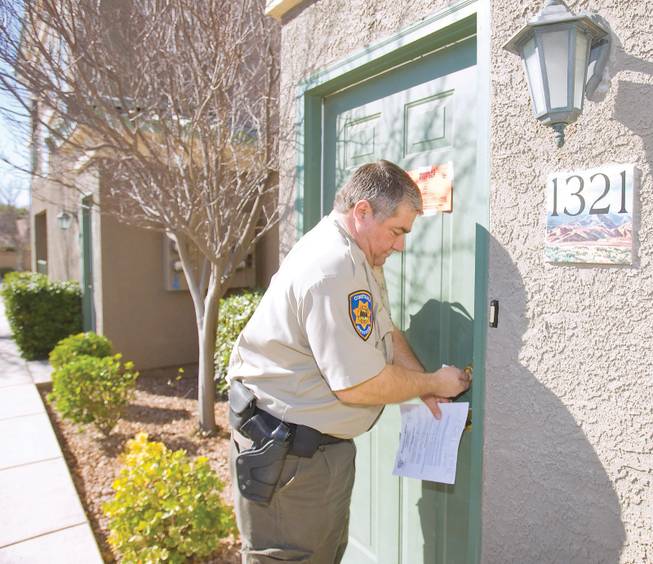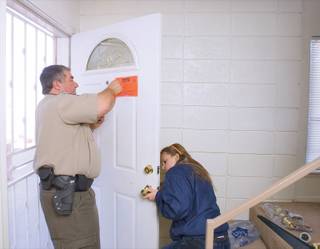
Keith Shimada / Special to the Home News
Constable Earl Mitchell locks the door to a residence during an eviction Tuesday in Henderson.
Friday, Jan. 30, 2009 | midnight
Sun Topics
For Henderson Constable Earl Mitchell, it’s an easy day.
As the department tasked with enforcing court-ordered evictions, Mitchell and his deputies have a trying, and occasionally heartbreaking, job — one that has only become worse as Southern Nevada has slipped into the stranglehold of the foreclosure crisis.
But after doing 17 evictions the previous day, Mitchell only has three evictions on this day’s docket, each one on an apartment tenant who has failed to pay rent and knows what’s coming. He needs little more than an hour to carry them out, and in each case, the tenants aren’t home. One of the apartments has already been vacated.
Thankfully, Mitchell says, today he doesn’t have to knock on the door of an unsuspecting renter and tell a family it’s time to go because the landlord hasn’t paid the mortgage.
“You have all these foreclosures on renters who had no clue what was happening,” Mitchell said. “They’re paying that rent to the homeowner, but the homeowner isn’t paying the mortgage.”
It’s an enormous injustice, Mitchell said, one created by a gaping hole in foreclosure law that Mitchell and his office hope to see fixed in this legislative session.
As the law is written, tenants have no right to know whether the property they are renting is in foreclosure. Many of them don’t find out until the constable shows up at the door, Mitchell said.
Mitchell and other Southern Nevada constable’s offices have persuaded legislators to introduce a bill that would require that tenants receive notification when a property enters foreclosure — not just the absentee landlords.
State Sen. Warren Hardy, R-Henderson/Boulder City, was on an interim legislative committee that examined the foreclosure crisis and discussed the proposal.
“One of the things that became obvious to us was that tenants are getting caught up in the middle of this,” Hardy said. “They’re paying their rent in good faith to the landlord, but the landlord isn’t paying the mortgage and the next thing they know, there’s a constable at the door.”
The bipartisan committee does not look kindly on that practice, Hardy said, and plans to crack down on it with legislation that would require landlords to notify tenants when foreclosure proceedings begin, and possibly make the failure to do so a felony.
Hardy said the committee was unable to get a feel for exactly how many Nevadans have been caught in that situation, but that it didn’t need an exact number.
“Sometimes in legislation you think, ‘Even if that’s just happened to one person, that’s too many,’” he said.
The proposed legislation had strong support from committee members of both parties, Hardy said, and he anticipates it will move forward rapidly when the session starts Monday. The bill will likely place the responsibility to notify tenants on landlords, not banks, he said.
“We’re saving the hardest-hitting part of it for landlords, who are acting fraudulently,” Hardy said. “We don’t want to overburden banks, but we definitely want to smack the landlords who are acting in this manner.”
Members of the Henderson Constable’s office, all retired police officers, say their effort to push for such a bill was a natural outgrowth of their credo: “Serving with professionalism, integrity and compassion.”
“The issue of compassion — that’s something we bring with us from all the years of doing police work,” Deputy Director Steve Kilgore said. “If you’re not doing it with your heart in it, it comes across as just cruel.”
The constable’s office first became aware of the problem in 2006, when it served an eviction on a Green Valley home that had been legally converted into a geriatric care facility, Kilgore said. When deputies arrived with the 24-hour notice to vacate, it came as a shock to the administrators and caregivers, who were current on their rent, he said.
Had the letter of the law been followed, 10 elderly patients in need of constant care would have been out on the street, he said. Instead, the office worked with the landlord, the bank and Clark County Social Services to make sure that caregivers had the time and means to properly move each resident.
“We’re doing our job,” Kilgore said. “Fair is fair — you don’t pay your rent, you don’t get to stay. But some of these (foreclosures) are just tragedies.”
The incident in 2006 was only the beginning of a trend. Anymore, tenants have become more cautious and are checking on the status of their residence to make sure it’s not in foreclosure, Mitchell said. As a result he is evicting fewer unsuspecting renters.
But there are still one or two doors a month behind which somebody is in for a sickening surprise, he said, and that’s something that he wants to see changed immediately.
“Somebody has to do this job,” he said. “We’re proud to say that we do it with integrity, compassion and respect.”
Out in the field this day, the property managers of the apartment complexes where Mitchell is serving eviction notices provide a ground-level view of the foreclosure crisis.
The first manager, who declines to give her name, says many of her tenants lost their previous home to foreclosure. Some had owned, others were renters caught off guard.
“That’s their big concern,” the manager said. “They’ve been foreclosed on or they know someone who has. Lots of them ask, ‘How do I know you’re not going to foreclose on me?’”
At the second stop, the Arroyo Grande Apartments on Stephanie Street, Mitchell serves two quick notices on vacant apartments while property manager Renee Miller sheds some light on the situation at apartment complexes. When the foreclosure crisis began in earnest early in 2008, many experts predicted that apartments would be flooded by displaced residents.
But as the foreclosure rate has climbed, Miller said, her apartment complex, like many others, has seen its occupancy rate plummet. At Arroyo Grande Apartments, it has gone from the more than 90 percent to 78 percent, and Miller said it will likely hit 73 percent in the near future.
Mitchell said he’s heard similar numbers from complexes around the city.
So if homes are vacant and apartment occupancy isn’t rising, where is everyone going?
“A lot of them are moving in with the parents,” Miller said. “Even grown adults are moving in with their parents. Some are moving in with their kids or other family members.”
Most of the people who leave the complex or get evicted lost their jobs, Miller said. Some dodge the eviction by moving out in the middle of the night and leaving their keys in the drop box.
“They’re embarrassed,” she said. “A lot of people are.”
As he follows a maintenance worker to the next apartment, Mitchell reflects on what he’s heard.
“Every day I count my blessings that I do have a job,” he said. “And I really feel for people who don’t.”
Jeremy Twitchell can be reached at 990-8928 or [email protected].


Join the Discussion:
Check this out for a full explanation of our conversion to the LiveFyre commenting system and instructions on how to sign up for an account.
Full comments policy